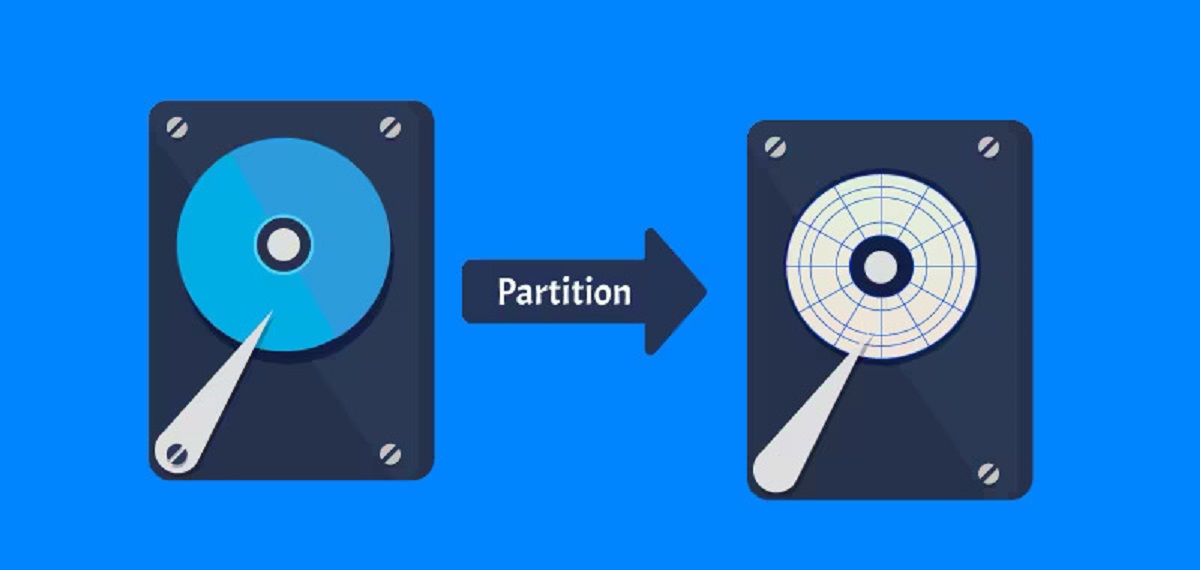Introduction
Welcome to the world of storage devices, where technology continues to evolve, providing us with faster, more efficient ways to store and access our valuable data. One such storage solution that has stood the test of time is the Volume Hard Disk Drive (HDD). Whether it’s for personal use or in enterprise settings, the volume hard disk drive has become an essential component for storing large amounts of data securely.
When it comes to data storage, the volume hard disk drive reigns supreme due to its reliability, cost-effectiveness, and widespread availability. With their ability to store massive amounts of data, ranging from a few gigabytes to several terabytes, volume hard disk drives have become the go-to choice for many individuals and organizations alike.
But what exactly is a volume hard disk drive? How does it work, and how does it compare to other storage devices on the market? In this article, we’ll explore the ins and outs of volume hard disk drives, their advantages, disadvantages, common uses, factors to consider when choosing one, and tips for maintaining their performance over time. Whether you’re a tech enthusiast or new to the world of storage devices, this article will provide you with valuable insights into the world of volume hard disk drives.
So, fasten your seatbelts and get ready to dive deep into the fascinating world of volume hard disk drives. By the end of this article, you’ll have a clear understanding of what makes them a reliable and efficient choice for your data storage needs.
Definition of Volume Hard Disk Drive
A volume hard disk drive, commonly referred to as a HDD, is a non-volatile storage device used to store and retrieve digital data. It consists of one or more magnetic platters coated with a magnetic material and a read/write head that moves across the surface of the platters to read and write data. The platters are mounted on a spindle that spins at high speeds, typically ranging from 5,400 to 15,000 revolutions per minute (RPM).
The capacity of a volume hard disk drive is determined by the number of platters it contains and the density of data that can be stored on each platter. Over the years, advancements in technology have allowed for increased storage capacities, with modern HDDs offering terabytes of storage space.
One key characteristic of volume hard disk drives is their ability to retain data even when the power is turned off. This is known as non-volatile storage, which means that the data remains intact for long periods, making HDDs ideal for long-term data storage.
Volume hard disk drives are commonly used in desktop computers, laptops, servers, and external storage devices. They provide a cost-effective solution for storing large amounts of data, making them popular in both personal and professional settings.
It is important to note that volume hard disk drives are different from solid-state drives (SSDs), another type of storage device commonly used today. While SSDs use flash memory to store data, volume hard disk drives rely on magnetic storage technology.
In summary, a volume hard disk drive is a non-volatile storage device that uses magnetic storage technology to store and retrieve digital data. It offers high storage capacities, cost-effectiveness, and widespread compatibility, making it a reliable choice for data storage needs in various applications.
How Does Volume Hard Disk Drive Work?
Understanding how a volume hard disk drive (HDD) works is essential to comprehend its functionality and why it has been a dominant storage solution for decades. At its core, an HDD operates based on magnetic storage technology, which involves the use of magnetic fields to store and retrieve data.
When data is written to an HDD, the read/write head moves across the spinning magnetic platters. The head uses magnetic fields to manipulate the magnetic particles on the platter’s surface, aligning them in patterns to represent the digital data. These patterns are organized into tracks, which are further subdivided into sectors. Each sector can store a fixed amount of data, commonly 512 bytes.
Reading data from an HDD follows a similar process. The read/write head detects the magnetic fields on the spinning platter, and the changes in these fields are converted into electrical signals. These signals are then processed by the HDD’s electronics to retrieve the stored digital data.
The speed at which data can be written or read from an HDD is influenced by various factors. One vital aspect is the rotational speed of the platters, measured in revolutions per minute (RPM). Higher RPM values result in faster data access times, as the read/write head can reach the desired data more quickly. However, higher RPM drives tend to generate more heat and consume more power.
Another factor affecting the performance of an HDD is its data transfer rate, which refers to the speed at which data can be transferred between the drive and the computer’s processor. This rate is influenced by the technology used in the drive’s interface (e.g., SATA, SAS) and the drive’s cache size, which temporarily stores frequently accessed data for faster retrieval.
Volume hard disk drives also employ various technologies to maintain data integrity and reliability. One such technology is error-correcting code (ECC), which helps detect and correct errors that occur during data transfer. Additionally, the drive’s firmware includes features like bad sector management, which allows the drive to mark and avoid faulty sectors.
Overall, the functioning of a volume hard disk drive is a complex interplay of hardware, magnetic storage mechanisms, and electronic components. The combination of these elements allows for the reliable storage and retrieval of vast amounts of data in a cost-effective manner.
Advantages of Volume Hard Disk Drive
Volume hard disk drives (HDDs) offer several advantages that have contributed to their widespread popularity and continued usage in various applications. Let’s explore the key advantages of using an HDD as a storage solution:
- High Storage Capacity: One of the most significant advantages of HDDs is their ability to provide high storage capacities at relatively lower costs compared to other storage technologies. Modern HDDs can store terabytes of data, making them ideal for storing large files, multimedia content, and vast databases.
- Cost-Effective: HDDs are more cost-effective in terms of price per unit of storage compared to other storage options like solid-state drives (SSDs). This makes them a preferred choice, especially for storing large amounts of data where affordability is crucial.
- Compatibility: HDDs are compatible with a wide range of devices. They can be easily integrated into desktop computers, laptops, servers, network-attached storage (NAS), and external storage solutions. Their broad compatibility ensures that data can be accessed and transferred across different platforms and systems.
- Longevity: HDDs have a long lifespan, allowing them to reliably store data for extended periods. With proper care and maintenance, HDDs can last for several years, making them suitable for long-term data storage needs.
- Data Retention: One of the significant advantages of HDDs is their ability to retain data even when powered off. This makes them well-suited for archival storage, where data needs to be preserved for an extended duration without frequent access.
- Sequential Read/Write Performance: HDDs excel in sequential data transfer operations, which involve accessing large, contiguous blocks of data. They perform exceptionally well in scenarios such as streaming media, large file transfers, and database operations that require reading or writing data in a linear manner.
While solid-state drives (SSDs) offer advantages in terms of faster random access times and shock resistance, volume hard disk drives continue to dominate the storage market due to their cost-effectiveness, high storage capacities, and compatibility with a wide range of devices and systems. These advantages make HDDs an attractive choice for individuals and organizations looking for reliable and affordable storage solutions for large-scale data storage needs.
Disadvantages of Volume Hard Disk Drive
While volume hard disk drives (HDDs) offer many benefits, they also have some disadvantages that are important to consider when choosing a storage solution. Let’s explore the key disadvantages:
- Mechanical Components: HDDs consist of spinning platters and a read/write head that moves across the surface. The mechanical nature of HDDs makes them susceptible to mechanical failure, such as head crashes or motor issues, which can result in data loss and drive failure.
- Slower Access Time: Compared to solid-state drives (SSDs), HDDs have slower access times. This means that it takes longer for the read/write head to locate and retrieve data from different locations on the spinning platters. As a result, tasks requiring fast random access, such as booting up the operating system or launching applications, may be slower with an HDD.
- Noise and Heat: Due to the spinning platters and moving read/write head, HDDs generate mechanical noise and heat during operation. This can be a concern, especially in quiet environments or in systems with poor cooling, which may lead to increased system temperatures and potential performance degradation.
- Vulnerable to Physical Damage: HDDs are sensitive to physical shocks and vibrations. Moving or dropping a device with an HDD while it’s operating can result in damage to the drive, leading to data loss or drive malfunction. Therefore, extra care must be taken to ensure the safety of HDD-based devices, especially portable ones.
- Power Consumption: HDDs consume more power compared to SSDs. The spinning platters, motor, and read/write head require energy to operate, leading to increased power consumption. This can be a concern for portable devices, as it can impact battery life and overall energy efficiency.
- Limited Lifespan: While HDDs can last for several years with proper care, they have a limited lifespan compared to other storage technologies like SSDs. The mechanical components of HDDs will eventually wear out over time, affecting their performance and reliability. Regular backups and proper maintenance are essential to mitigate the risk of data loss due to drive failure.
Despite these drawbacks, volume hard disk drives continue to be widely used due to their affordability, high storage capacities, and compatibility. It’s important to weigh these disadvantages against your specific needs and requirements to make an informed decision when choosing a storage solution.
Differences Between Volume Hard Disk Drive and Other Storage Devices
When it comes to storage devices, there are various options available in the market, each with its own set of characteristics and advantages. Let’s explore the key differences between volume hard disk drives (HDDs) and other popular storage devices:
- Solid-State Drives (SSDs): SSDs differ from HDDs in terms of storage technology. While HDDs use magnetic storage and spinning platters, SSDs utilize flash memory chips to store data. This fundamental difference results in several distinctions between the two types of storage devices. SSDs offer faster access times, improved reliability due to no mechanical parts, lower power consumption, and resistance to physical shocks or vibrations. However, SSDs generally have a higher cost per unit of storage compared to HDDs and may have lower storage capacities.
- Hybrid Drives: Hybrid drives, also known as solid-state hybrid drives (SSHDs), combine the advantages of both HDDs and SSDs. These drives consist of a traditional HDD with a smaller amount of solid-state memory. The solid-state memory acts as a cache to store frequently accessed data, providing faster access times for those files. Hybrid drives are often more affordable compared to pure SSDs and offer higher storage capacities than an SSD alone, making them a good compromise between performance and cost.
- USB Flash Drives: USB flash drives, commonly known as thumb drives or USB sticks, are small portable storage devices that use flash memory to store data. They are compact, lightweight, and offer high-speed data transfer. USB flash drives are mainly used for transferring and storing files on the go. However, they generally have lower storage capacities compared to HDDs and SSDs.
- Network-Attached Storage (NAS): NAS devices are specialized storage solutions that connect to a network, allowing multiple users to access and share files over the network. NAS devices can use HDDs or SSDs for storage and offer additional features like data redundancy, remote access, and centralized management. NAS devices are commonly used in home or office environments where shared and easily accessible storage is required.
- Cloud Storage: Cloud storage is a service that allows users to store and access their data remotely over the internet. Instead of relying on physical storage devices like HDDs or SSDs, users can upload their files to remote servers maintained by cloud storage providers. Cloud storage offers the advantage of scalability, accessibility from anywhere with an internet connection, and data redundancy. However, it also relies on the stability and security of internet connectivity.
Each type of storage device has its own unique characteristics and is suitable for different use cases. When choosing between volume hard disk drives and other storage devices, it’s essential to consider factors such as performance requirements, cost, storage capacity, reliability, and specific usage scenarios.
Common Uses of Volume Hard Disk Drive
Volume hard disk drives (HDDs) have been a staple storage solution across various industries and applications. Their high storage capacity, cost-effectiveness, and compatibility have made them suitable for a wide range of purposes. Let’s explore some of the common uses of HDDs:
- Personal Computing: HDDs are widely used in personal computers, both desktops and laptops. They serve as the primary storage device for operating systems, software applications, and personal files. HDDs provide ample space for storing documents, photos, videos, and other digital content on individuals’ computers.
- Enterprise Storage: In enterprise settings, HDDs are commonly used for server storage and data centers. These environments require large-scale storage solutions to handle immense amounts of data generated by businesses. HDDs offer high storage capacities, allowing companies to store critical business data, databases, virtual machines, and other enterprise applications at a lower cost compared to other storage options.
- Media and Entertainment: The media and entertainment industry heavily relies on HDDs for digital content storage. Whether it’s storing video footage, audio recordings, graphics files, or post-production files, HDDs provide the necessary space to store and access large media files. They are also ideal for multimedia editing and rendering, ensuring smooth playback and efficient editing workflows.
- Backup and Archiving: HDDs are commonly used as backup and archival storage solutions. Data backups are crucial for protecting against data loss, and HDDs offer a cost-effective and reliable option for creating redundant copies of critical files and systems. Archival storage, which involves storing data for long-term retention, also benefits from the longevity and non-volatile nature of HDDs.
- Gaming Consoles: HDDs have found their way into gaming consoles, providing storage space for game installations, downloadable content, and game saves. As modern games continue to increase in size, the high storage capacity of HDDs is essential for avid gamers who have a vast library of games.
- Surveillance Systems: HDDs are extensively used in video surveillance systems, where large amounts of video footage need to be stored for extended periods. HDDs provide the necessary capacity to store high-definition video recordings from multiple cameras, ensuring reliable and long-term storage for surveillance purposes.
These are just a few examples of the common uses of volume hard disk drives. Their versatility, cost-effectiveness, and ability to handle large amounts of data make them suitable for a wide range of applications in various industries.
Factors to Consider When Choosing a Volume Hard Disk Drive
When selecting a volume hard disk drive (HDD) for your storage needs, several factors should be taken into consideration. Understanding these factors will help you make an informed decision and choose the right HDD for your specific requirements. Let’s explore some key factors to consider:
- Storage Capacity: Determine the amount of storage space you need based on the size of your files, applications, and data. Consider future growth and scalability requirements when selecting the storage capacity of your HDD.
- Speed and Performance: Assess the speed and performance of the HDD, especially the rotational speed measured in revolutions per minute (RPM). Higher RPM values generally result in faster data access times and improved overall performance.
- Interface: Consider the interface of the HDD, which determines how it connects to your computer or storage system. Common interfaces include SATA (Serial ATA) and SAS (Serial Attached SCSI). Ensure compatibility with your existing hardware or storage infrastructure.
- Cache Size: The cache size of an HDD, also known as the buffer, affects its performance. A larger cache can help improve data transfer speeds and enhance overall performance, especially during read and write operations.
- Durability and Reliability: Consider the durability and reliability of the HDD. Look for drives with built-in features such as error-correcting code (ECC) and technologies to handle bad sectors or prevent data loss. Additionally, research the manufacturer’s reputation for producing reliable and long-lasting drives.
- Compatibility: Ensure that the HDD is compatible with your intended use case, whether it’s for personal computers, enterprise storage systems, or other devices. Verify compatibility with the operating system, hardware, and any specific requirements of your storage infrastructure.
- Price: Compare the prices of different HDD models to find one that fits your budget. Consider the balance between cost and the desired storage capacity and performance of the HDD.
- Warranty and Support: Check the warranty and support provided by the HDD manufacturer. A longer warranty period and reliable customer support can provide peace of mind and assistance in case of any issues or failures.
By considering these factors, you can make an informed decision and select the most suitable volume hard disk drive for your specific storage requirements. Assess your needs, prioritize the factors that are most important to you, and choose a reliable and compatible HDD that offers the right balance of storage capacity, performance, and affordability.
Tips for Maintaining Volume Hard Disk Drive
Maintaining a volume hard disk drive (HDD) is essential to ensure its longevity, reliability, and optimal performance. By following these tips, you can prolong the life of your HDD and maintain its efficiency:
- Handle with Care: Hard disk drives are sensitive to physical shocks and vibrations. Avoid dropping or jarring the HDD, especially while it’s in operation. Use caution when moving or transporting devices with an HDD installed to prevent damage to the drive.
- Keep Temperature in Check: Excessive heat can damage HDDs. Ensure proper ventilation and cooling for your computer or storage system to maintain an optimal operating temperature for the HDD. Avoid placing the HDD in direct sunlight or near heat-emitting components.
- Perform Regular Data Backups: Regularly back up your data to external storage or cloud storage. This precautionary measure ensures that your important files are safe in case of HDD failure or data corruption. Consider using reliable backup software or automated backup solutions for convenience.
- Protect Against Power Surges: Power fluctuations and electrical surges can harm your HDD. Use a surge protector or an uninterruptible power supply (UPS) to safeguard your HDD from sudden power spikes. This will help prevent data loss or potential damage due to power-related issues.
- Guard Against Malware and Viruses: Protect your HDD from malware and viruses that can compromise data integrity and affect performance. Install reliable antivirus software and keep it up to date. Regularly scan your HDD for malware and ensure that your operating system and applications have the latest security updates installed.
- Defragment Regularly: Over time, files on your HDD may become fragmented, leading to slower performance. Defragment your HDD on a regular basis to optimize file placement and improve read and write speeds. Most operating systems have built-in defragmentation tools, or you can use third-party software for this purpose.
- Avoid Overfilling: Avoid filling your HDD to its maximum capacity, as this can negatively impact performance. Leave some free space to allow the operating system and HDD to work efficiently. Aim to keep at least 10-20% of the total capacity free for optimal performance.
- Regularly Check for Errors: Periodically check your HDD for any errors or bad sectors. Most operating systems have built-in disk checking utilities that can scan and repair any issues. Running disk checks can help identify and fix errors, minimizing the chances of data corruption or drive failures.
By following these maintenance tips, you can help ensure the smooth operation and longevity of your volume hard disk drive. Taking proactive steps to protect and maintain your HDD will not only keep your data safe but also optimize its performance for years to come.
Conclusion
Volume hard disk drives (HDDs) have proven to be a reliable and cost-effective storage solution for a wide range of applications. With their high storage capacities, compatibility, and long lifespan, HDDs continue to be a popular choice for individuals and organizations alike.
Throughout this article, we have explored the definition of volume hard disk drives, how they work, their advantages, disadvantages, and the differences between HDDs and other storage devices. We have also discussed the common uses of HDDs and factors to consider when choosing one. Additionally, we provided tips for maintaining the performance and longevity of your HDD.
While volume hard disk drives have some drawbacks, such as slower access times and vulnerability to physical damage, their affordability and ability to store large amounts of data make them a practical choice for many storage needs.
As technology advances, the storage landscape continues to evolve, with solid-state drives (SSDs) and other emerging storage options gaining popularity. However, HDDs remain a reliable and widely-used solution, particularly in applications that require high storage capacity at a lower cost.
When selecting a volume hard disk drive, it is important to consider factors such as storage capacity, speed, reliability, compatibility, and price. Regular maintenance, including proper handling, temperature control, data backups, and protection against power surges and malware, is crucial for ensuring the optimal performance and longevity of your HDD.
In conclusion, volume hard disk drives are versatile and dependable storage devices that have stood the test of time. By understanding their capabilities, limitations, and maintenance requirements, you can make informed decisions to meet your specific storage needs.

























